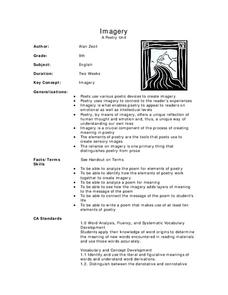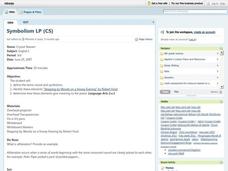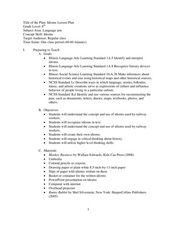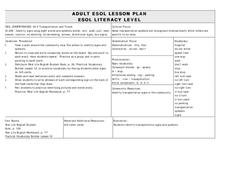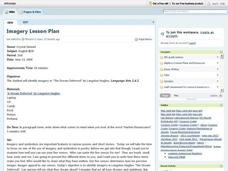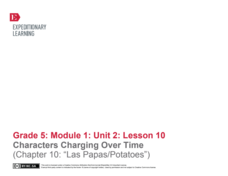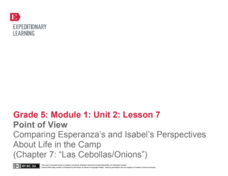Curated OER
Figurative Language-Part 1
Young scholars explore figurative language. For this figurative language lesson, students look up, define, and give examples of a list of literary terms.
Curated OER
Flashbacks
Students create a piece of original fiction utilizing flashbacks. Students define and identify the use of flashbacks in the novel Holes. Definitions and examples are recorded in student journals. They use their examples as springboard...
Curated OER
Do-deca-he-dron-It's Greek to Me!
Students create a dodecahedron shaped visual report of the literary elements of a short story.
Curated OER
Imagery
Ninth graders explore poems, various poetic devices, and identify imagery used in poetry. In groups, they examine poetic devices, define them, paraphrase and summarize poetry. Students study poetry by Robert Frost as they explore...
Curated OER
Color Review Bingo
Young scholars identify, describe and review the definitions of various key terms from the attached word list. Then, they draw a bingo card--5 columns across and 5 rows down and fill in their Bingo sheets with the terms listed. ...
Curated OER
Metaphors, Personifications, Similes, and Hyperboles
Fourth graders discuss prior knowledge of the terms simile, hyperbole, metaphor, and personification. They then listen to the definitions of each and write a hyperbole, personification, simile, and metaphor to describe a Mr. Potato Head...
Curated OER
Symbolism Lesson Plan
Students define the terms symbolism and mood. In groups, they read a poem by Robert Frost and identify the concepts in the poem. As a class, they discuss how the two elements give a meaning to the writing. They also give their own...
Curated OER
Analyzing Atmosphere: Macbeth Murder Scene and Dagger Speech
Shakespeare's Macbeth (Act II, Scenes I and II) lacks explicit details of the murder of King Duncan, yet the author creates an atmosphere that allows us to visualize the event. Readers interpret the "Dagger Speech" by writing stage...
Georgia Department of Education
Exploring Poetry and Poets
Combine the study of poetry and non-fiction texts with this complete and ready-to-use six-week unit. After reading numerous poems from local writers and compiling a personal anthology, high schoolers find and read a memoir or biography...
Little, Brown and Company
The Catcher in the Rye: Vocabulary Bingo
After finishing The Catcher in the Rye, review new vocabulary with an individualized bingo game. Class members develop a list of new vocabulary drawn from the novel or literary devices studied during the unit. Individuals then place...
Curated OER
Find Figurative Language
Meet with the school library specialist and work together to plan a visit and presentation on figurative language. After defining and examining examples of targeted terms, the class travels to the library where the SL has collected...
Curated OER
Idioms Lesson Plan
Sixth graders discover idioms. In this idioms lesson, 6th graders evaluate idioms and discover their meaning. Students read Runny Babbit by Shel Silverstein and create unique idioms. Assessment rubric is provided.
Curated OER
ADULT ESOL LESSON PLAN--Transportation and Travel
Students, while defining an extensive list of vocabulary terms on the board, identify common signs and symbols that they may encounter when traveling or using some form of transportation (enter, exit, push, pull, men,
women, caution, no...
Curated OER
Imagery Lesson Plan
Students are introduced to the term imagery. Individually, they read "The Dream Deferred" and note examples of imagery in the poem. To end the lesson, they write their own poem making sure to use the five components of imagery.
Curated OER
We the Past
Students study philanthropy related terms and philanthropy in the United States and their local community. In this philanthropy lesson plan, students study pictures of present and past Americans and discuss their philanthropic acts....
Curated OER
Figurative Language
What is figurative language, and why do we use it? Introduce your high schoolers to some examples and discuss the importance of including this element in your writing. After studying a text and searching for examples, writers will...
Curated OER
The Outsiders
Tenth graders complete a variety of activities related to the first two chapters of the book The Outsiders. They define metaphor, simile, idiom, and hyperbole, and take a vocabulary pre-quiz. In small groups, they write a character...
EngageNY
Characters Changing Over Time (Chapter 10: "Las Papas/Potatos")
Engage further in Esperanza Rising with a focus on close reading and metaphor. Class members zero in on the tenth chapter, examining characters and big ideas. Pupils discuss the text in small groups and as a whole class, and...
Museum of Tolerance
Immigration Journeys
Through the journey of four stories of immigration, scholars complete graphic organizers and apply knowledge to create a visual representation of their findings on a large poster. Third and fourth readers write a letter to their...
EngageNY
Point of View: Comparing Esperanza's and Isabel's Perspectives About Life in the Camp (Chapter 7: "Las Cebollas/Onions")
Explore point of view and more with a Common Core-designed instructional activity. Learners experience different points of view by representing one of two characters from Esperanza Rising during a partner discussion. They must use...
Curated OER
Pen and Ink Drawing
Learners hone their drawing techniques to create a nature-inspired piece of art. They practice hatching, cross hatching, stippling, and shading. They discuss how each method is better suited for creating specific elements in nature such...
Curated OER
Lesson Plan for C.S Lewis’ The Magician’s Nephew
Here is a lesson that incorporates music writing, and reading literature. The class reads chapter eight from the C.S. Lewis classic The Magician's Nephew. Then, just like in the story, they use music as inspiration to create (write)...
Curated OER
Alleluia
Singers practice perfecting the song, Alleluia. They focus on singing techniques, style, phrasing, and working with syncopation. This lesson is a microteahing lesson and includes a warm up and vocal exercises.
Curated OER
Soap Opera Unit of Work: KS4
Students view an episode of "Eastenders." They look at how the programme is structured in terms of individual scenes. Students view the opening of the soap and the significane of the theme music. They look at the characters and trace the...



